 I’m over at Word Whores, giving some of my favorite bits of banter and conversational sparring between Harlan and Ursula – including some sneak peeks from future books!
I’m over at Word Whores, giving some of my favorite bits of banter and conversational sparring between Harlan and Ursula – including some sneak peeks from future books!
Category: Blog
Holiday Romance Without the Schmaltz
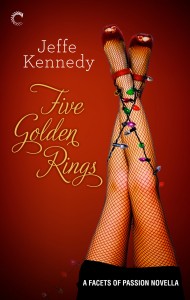 I’m over at the Contemporary Romance Cafe today, talking about my take on writing a holiday story.
I’m over at the Contemporary Romance Cafe today, talking about my take on writing a holiday story.
French Club and Other Sekrit Societies
 The full moon setting at sunrise. Such lovely color!
The full moon setting at sunrise. Such lovely color!
Back when I was in grad school, lo these many moons ago, one gal in the department started up a weekly (maybe monthly? I don’t really recall) meeting of those of us who spoke French. She’d been in the Peace Corps in north Africa and felt like her French was getting rusty. I’d become reasonably fluent while studying the language in college, but I’d also gotten less so with disuse, so it sounded fun to me. It would also be a break from All The Science.
So, we’d go over to her apartment, bring wine and snacks and converse in French. There were like five or six of us and it just so happened that we were all female.
Well – this drove the guys NUTS! We were a fairly small department – Zoology & Physiology – and all knew each other pretty well. We had Friday afternoon brown bag discussions, where we took turns giving presentations on our research (which included beer and frequently culminated in a mas migration to the campus beer garden) along with weekly department seminars, joint classes that we both took and taught, frequent potlucks and barbeques, etc.
The guys kept asking us, “What do you do? Do you sit around in lingerie or something?”
We’d answer, “We drink wine, eat snacks and gossip in French.” They were welcome to join us, but they protested that they didn’t speak French. We told them it was no different than other parties, except we spoke French.
They simply could not get their heads around it and wouldn’t let the topic go.
I think it had to do with feeling closed out of something, which I understand, but also the male/female dynamic played in. I think if even one guy had been part of French Club, they wouldn’t have thought about it. But something about the women getting together without them got under their skin. They also sexualized it – with a lot of their questions along the lines of the lingerie thing and pillow fights.
I’m thinking about this because of some groups wanting to create “safe spaces” on the internet – which can mean females and female-oriented topics – and men objecting to it, calling it cliquey and elitist. I can understand the feeling left out, but… I dunno. Sometimes I think it’s okay for people do things without others looking over their shoulders.
Also, my French is nearly nonexistent now. Alas.
Setting Writing Goals You Can Actually Meet
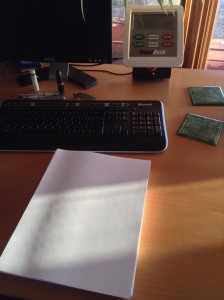 I’m over at Word Whores, giving my annual advice on how to make NaNoWriMo work for you – not just for this month, but for the sustainable future.
I’m over at Word Whores, giving my annual advice on how to make NaNoWriMo work for you – not just for this month, but for the sustainable future.
The TBR!
 I’ve been posting to Facebook and Twitter about my project to organize my TBR pile – both physical and virtual. I’m hoping that by putting them all into a spreadsheet I can prioritize what to read next and hopefully avoid duplications. I’m really psyched to put a dent in this list! There’s 272 print, audio and ebooks on the list. (I originally said 275, but I found a few that I had indeed read on the final pass.)
I’ve been posting to Facebook and Twitter about my project to organize my TBR pile – both physical and virtual. I’m hoping that by putting them all into a spreadsheet I can prioritize what to read next and hopefully avoid duplications. I’m really psyched to put a dent in this list! There’s 272 print, audio and ebooks on the list. (I originally said 275, but I found a few that I had indeed read on the final pass.)
Several people asked to see the list, so here it is in order of author first name. I have my own list sorted according to my arcane set of priorities, but I didn’t want to share it that way, lest anyone get their feelings hurt.
Here it is!
| Pale Queen Rising (Pale Queen Series Book 1) | A. R. Kahler |
| Twisted Miracles (The Shadowminds) | A.J. Larrieu |
| Mind Sweeper (Mind Sweeper Series Book 1) | AE Jones |
| Consequences | Aleatha Romig |
| Defeat the Darkness | Alexis Morgan |
| Dark Warrior Unbroken | Alexis Morgan |
| Love in the Afternoon (Feeling the Heat Book 1) | Alison Packard |
| Atlantis Unleashed | Alyssa Day |
| Atlantis Betrayed | Alyssa Day |
| The Lair of the Twelve Princesses | Amanda C. Davis |
| The Kingdom (The Graveyard Queen Book 2) | Amanda Stevens |
| The Martian | Andy Weir |
| The Breaker’s Concubine | Ann Mayburn |
| This Is the Story of a Happy Marriage | Ann Patchett |
| Blades of the Old Empire: Book I of the Majat Code | Anna Kashina |
| The Guild of Assassins: Book Two of The Majat Code | Anna Kashina |
| The Majat Testing (The Majat Code) | Anna Kashina |
| Uncommon Passion | Anne Calhoun |
| Uncommon Pleasure | Anne Calhoun |
| The Seal’s Rebel Librarian | Anne Calhoun |
| The Seal’s Secret | Anne Calhoun |
| The Seal’s Second Chance | Anne Calhoun |
| Evening Storm | Anne Calhoun |
| Transcendent (Irresistible Series Book 2) | Anne Calhoun |
| Jaded | Anne Calhoun |
| The Girl in 6E | AR Torre |
| The Poetics | Aristotle |
| The All You Can Dream Buffet | Barbara O’Neal |
| Solatium (Emanations, an urban fantasy series Book 2) | Becca Mills |
| Passion Play | Beth Bernobich |
| The Creative Fire (Ruby’s Song) | Brenda Cooper |
| Black Sun Rising: The Coldfire Trilogy, Book One | C.S. Friedman |
| Crown of Shadows: The Coldfire Trilogy, Book Three | C.S. Friedman |
| When True Night Falls: The Coldfire Trilogy, Book Two | C.S. Friedman |
| Silk | Caitlin R Kiernan |
| Touch Me | Callie Croix |
| Wind Follower | Carole McDonnell |
| Free Fall (A My Immortals Series Demons and Witches novella) | Carolyn Jewel |
| Eyes Like Sky And Coal And Moonlight | Cat Rambo |
| Always and Forever | Cathy Kelly |
| With this Ring | Celeste Bradley |
| 1 Dead in Attic | Chris Rose |
| Losing Mum and Pup | Christopher Buckley |
| Lady of Light and Shadows | CL Wilson |
| King of Sword and Sky | CL Wilson |
| Queen of Song and Souls | CL Wilson |
| Crown of Crystal Flame | CL Wilson |
| The Shadow Revolution: Crown & Key | Clay Griffith |
| A Malady of Magicks (The Ebenezum Series Book 1) | Craig Shaw Gardner |
| Unlovable | Cynthia St. Aubin |
| Hot Head | Damon Suede |
| Reluctant Concubine (Hardstorm Saga Book 1) | Dana Marton |
| The Tao of Jung – the Way of lntegrity | David Rosen |
| Dying Bites: The Bloodhound Files | DD Barant |
| Dream | Del Dryden |
| Sex on the Beach | Del Dryden |
| Mai Tai for Two | Del Dryden |
| Bitter Night | Diana Pharaoh Francis |
| Charmed Life (Chronicles of Chrestomanci Book 1) | Diana Wynne Jones |
| The Thirteenth Tale: A Novel | Diane Setterfield |
| The Thirteenth Tale | Diane Setterfield |
| The Thousand Names: Book One of the Shadow Campaigns | Django Wexler |
| The Reckoners | Doranna Durgin |
| Storm of Reckoning | Doranna Durgin |
| The Beauty’s Beast | ED Walker |
| The Heaven Tree trilogy | Edith Pagetter |
| Cheerful – By Request | Edna Ferber |
| Erotic Poems | ee cummings |
| Twisted | Elisabeth Naughton |
| Slave To Pleasure | Eliza Gayle |
| Eat Pray Love | Elizabeth Gilbert |
| A Hidden Fire: Elemental Mysteries Book One | Elizabeth Hunter |
| The Seduction of Lady Phoebe (The Marriage Game Book 1) | Ella Quinn |
| Strange Attractions (Berkley Sensation) | Emma Holly |
| Master of the Game | Emma Petersen |
| Blood Cursed | Erica Hayes |
| Shadow Bound | Erin Kellison |
| The Secret Heart (No Better Angels Book 1) | Erin Satie |
| A Vampire Quintet | Eugie Foster |
| Blood Cross: A Jane Yellowrock Novel | Faith Hunter |
| You’re Never Weird on the Internet | Felicia Day |
| Boomerang Bride | Fiona Lowe |
| Dead Man’s Rain (The Markhat Files Book 2) | Frank Tuttle |
| Dragon Actually (Dragon Kin series Book 1) | G. A. Aiken |
| His Last Duchess | Gabrielle Kimm |
| Sabriel (The Old Kingdom Book 1) | Garth Nix |
| The Darkest Kiss | Gena Showalter |
| Home Fires | Gene Wolfe |
| Phantastes | George MacDonald |
| Love Letters Volume 1: Obeying Desire (The Love Letters) | Ginny Glass |
| The Duke’s Disaster | Grace Burrowes |
| Douglas | Grace Burrowes |
| The Lightning God’s Wife: a short story | Grace Draven |
| The Collected Stories | Grace Paley |
| The Lions of Al-Rassan | Guy Gavriel Kay |
| Romancing the Holiday: We’ll Be Home for Christmas\Ask Her.. | HelenKay Dimon |
| The Secret of the Unicorn | Herge |
| Atonement | Ian McEwan |
| Burn for Me | Ilona Andrews |
| Thorn | Intisar Khanani |
| Faery Song | Isabo Kelly |
| Obernewtyn: The Obernewtyn Chronicles 1 | Isobelle Carmody |
| The Golden City | J. Kathleen Cheney |
| Renegade | JA Souders |
| Naamah’s Curse (Moirin’s Trilogy Book 2) | Jacqueline Carey |
| Santa Olivia | Jacqueline Carey |
| The Golden Bough | James George Frazer |
| Persuasion (Illustrated) | Jane Austen |
| The King’s Viper | Janine Ashbless |
| Warhost of Vastmark | Janny Wurts |
| The Curse of the Mistwraith | Janny Wurts |
| Management Skills | January Rowe |
| Better When He’s Bad | Jay Crownover |
| Three Hearts | JC Nelson |
| Leopard Moon (Moon series Book 1) | Jeanette Battista |
| Up from the Grave | Jeaniene Frost |
| Blood Drive | Jeanne C Stein |
| Karma Girl (The Bigtime series Book 1) | Jennifer Estep |
| Don’t Breathe a Word: A Novel | Jennifer McMahon |
| The Scarecrow King: A Romantic Retelling of the King.. | Jill Myles |
| Always on My Mind | Jill Shalvis |
| Tempted by His Target | Jill Sorenson |
| Storm Front (The Dresden Files, Book 1) | Jim Butcher |
| The Lady’s Secret | Joanna Chambers |
| The Harlot Countess | Joanna Shupe |
| Incarnate | Jodi Meadows |
| Redshirts: Chapters 1-4 | John Scalzi |
| Johannes Cabal, the Necromancer | Jonathan L Howard |
| Beast (Avon Romantic Treasure) | Judith Ivory |
| It’s in His Kiss | Julia Quinn |
| When He was Wicked | Julia Quinn |
| Caress of Darkness | Julie Kenner |
| Wanted | Julie Kenner |
| Say My Name | Julie Kenner |
| Larcout (Fire Born, Blood Blessed Book 1) | K.A. Krantz |
| Red Hot Holiday: Wish List\I Need You for Christmas\Breath.. | K.A. Mitchell |
| Grave Witch | Kalayna Price |
| Heart of the Dragon’s Realm | Karalynn Lee |
| Inked (Cassie Palmer) | Karen Chance |
| Changeling: Prelude to the Chosen Chronicles | Karen Dales |
| Greywalker | Kat Richardson |
| Spirit Gate | Kate Elliott |
| King’s Dragon | Kate Elliott |
| Simply Sinful | Kate Pearce |
| A Lady’s Wish | Katharine Ashe |
| Breakdown | Katherine Amt Hanna |
| Everlasting | Kathleen Woodiwiss |
| A Match Made in Texas | Katie Lane |
| Ring in the Holidays | Katie Lane |
| Uncommon Arrangements: Married Life in London Literary Circles | Katie Roiphe |
| The Middle Place | Kelly Corrigan |
| The Better Part of Darkness | Kelly Gay |
| The Darkest Kiss | Keri Arthur |
| Embraced in Darkness | Keri Arthur |
| Hounded | Kevin Hearne |
| Synthetic Dreams | Kim Knox |
| Dark Needs at Night’s Edge | Kresley Cole |
| Own the Wind | Kristen Ashley |
| Daughter of Smoke and Bone | Laini Taylor |
| Lethal Rider | Larissa Ione |
| The Chocolate Rose: (A Prequel to La Vie en Roses Series) | Laura Florand |
| The Prince of Midnight | Laura Kinsale |
| By Royal Command | Laura Navarre |
| Goddess With a Blade | Lauren Dane |
| Last Night at Chateau Marmont | Lauren Weisberger |
| Touchstone | Laurie R. King |
| Shadow and Bone | Leigh Bardugo |
| Secrets of the Sands | Leona Wisoker |
| Grave Illusions (Jess Vandermire, Vampire Hunter Book 1) | Lina Gardiner |
| Games of Command | Linnea Sinclair |
| Hope’s Folly | Linnea Sinclair |
| A Civil Campaign | Lois McMaster Bujold |
| A Civil Campaign (Vorkosigan Saga Book 12) | Lois McMaster Bujold |
| Spellbent | Lucy A. Snyder |
| Bonds of Trust & Bonds of Need | Lynda Aicher |
| Dearest Friend | Lynne Withey |
| The Worth of a Shell (The Stone Moon Trilogy Book 1) | M.C.A. Hogarth |
| Blood of the Sorceress | Maggie Shayne |
| The Raven Boys | Maggie Stiefvater |
| Avenge Me | Maisey Yates |
| Nightmare Ink (A Living Ink Novel) | Marcella Burnard |
| The Blind Assassin | Margaret Atwood |
| The Year of the Flood (MaddAddam Trilogy, Book 2) | Margaret Atwood |
| Midnight Never Come | Marie Brennan |
| Beauty and the Wolf (The Cursed Princes Book 1) | Marina Myles |
| Undead Kama Sutra | Mario Acevedo |
| The Woman at the Washington Zoo | Marjorie Williams |
| Unfallen Dead | Mark del Franco |
| Thief of Songs | MCA Hogarth |
| The Position: A Novel | Meg Wolitzer |
| The Ten-Year Nap | Meg Wolitzer |
| Little Secrets | Megan Hart |
| Hold Me Close | Megan Hart |
| Tempted | Megan Hart |
| A Red Hot Valentine’s Day | Megan Hart |
| No Greater Pleasure | Megan Hart |
| If the Shoe Fits (Unruly Royals Book 2) | Megan Mulry |
| In Love Again (Unruly Royals Book 3) | Megan Mulry |
| A Little Harmless Submission | Melissa Schroeder |
| Home from the Sea | Mercedes Lackey |
| Archer’s Voice | Mia Sheridan |
| Cast in Shadow (Chronicles of Elantra, Book 1) (The.. | Michelle Sagara |
| The Duke of Dark Desires (The Wild Quartet) | Miranda Neville |
| The Importance of Being Wicked | Miranda Neville |
| Fire Kin | MJ Scott |
| The Magic of Recluce (saga of recluce Book 1) | Modesitt Jr. |
| Falling Kingdoms | Morgan Rhodes |
| Loving Frank | Nancy Horan |
| Uprooted | Naomi Novik |
| Think and Grow Rich | Napoleon Hill |
| Fight or Flight | Natalie Damschroder |
| Neverwhere | Neil Gaiman |
| The Liar | Nora Roberts |
| The Modern Fae’s Guide to Surviving Humanity (Daw Book.. | Palmatier |
| Scions: Insurrection | Patrice Michelle |
| Alphabet of Thorn | Patricia McKillip |
| Some Boys | Patty Blount |
| The Green Man and the Dragon | Paul Broadhurst |
| The Winter Witch | Paula Brackston |
| The Warded Man | Peter V Brett |
| Plato’s Erotic Dialogues | Plato |
| The Scroll Thief (A Tale of Ithian) | R.F. Long |
| Love Without Blood | Raz Steel |
| The Bridge | Rebecca Rogers Maher |
| The Red Wolf Conspiracy | Robert V.S. Redick |
| Assassin’s Apprentice (The Farseer Trilogy, Book 1) | Robin Hobb |
| Shadows | Robin McKinley |
| Water – Tales of Elemental Spirits | Robin McKinley |
| A Knot in the Grain and other stories | Robin McKinley |
| Fire: Tales of Elemental Spirits (Firebird Fantasy) | Robin Mckinley |
| The Door in the Hedge | Robin McKinley |
| Deeper | Robin York |
| Fallen | Roselynn Cannes |
| Sunset Rising: Book One | S. McEachern |
| The Twelve Nights of Christmas (Snowkissed and Seduced!) | Sarah Morgan |
| Rosemary and Rue: Book One of Toby Daye (October Daye Series.. | Seanan McGuire |
| Slow Summer Kisses | Shannon Stacey |
| Mystic and Rider (Twelve Houses series Book 1) | Sharon Shinn |
| Journey of Awakening (The Triune Stones) | Shawna Thomas |
| It’s In His Heart (A Red River Valley Novel) | Shelly Alexander |
| His at Night (The London Trilogy Series) | Sherry Thomas |
| Demon’s Captive (War Tribe Book 1) | Stephanie Snow |
| Daughter of Regals and Other Tales | Stephen R Donaldson |
| First Blood (The Guardians series) | Susan Sizemore |
| The Splendour Falls | Susanna Kearsley |
| The Winter Sea | Susanna Kearsley |
| The Admiral’s Bride (Tall, Dark and Dangerous Book 7) | Suzanne Brockmann |
| Pirate’s Alley (Sentinels of New Orleans Book 4) | Suzanne Johnson |
| Riding the Storm (ACRO Series Book 1) | Sydney Croft |
| Spellbound | Sylvia Day |
| Afterburn & Aftershock | Sylvia Day |
| Alanna: The First Adventure (Song of the Lioness series Book.. | Tamora Pierce |
| Terrier: The Legend of Beka Cooper #1 | Tamora Pierce |
| It Had to Be Him (An It Had to Be Novel Book 1) | Tamra Baumann |
| Getting Dumped – Part 1 A Shultz Sisters Mystery | Tawna Fenske |
| The Color of Magic (Discworld Book 1) | Terry Pratchett |
| A Night to Surrender | Tessa Dare |
| Jitterbug Perfume | Tom Robbins |
| Vicious | V. E. Schwab |
| Property | Valerie Martin |
| What My Mother Gave Me | Various |
| Rocket Dragons Ignite | Various |
| Worlds of Edgar Rice Burroughs | Various |
| Star Cruise: Marooned | Veronica Scott |
| A Rake’s Guide To Pleasure (Zebra Historical Romance) | Victoria Dahl |
| Fanning the Flames: A Girls’ Night Out novella (Jackson:.. | Victoria Dahl |
| The Guy Next Door | Victoria Dahl |
| Carolina Man | Virginia Kantra |
| Distrust That Particular Flavor | William Gibson |
| Spook Country | William Gibson |
| The Xandra King Erotic Romance Collection: Celestina and the.. | Xandra King |
| The Curious Trio | Yoko Tsuno |
Great News for ROGUE’S PAWN!
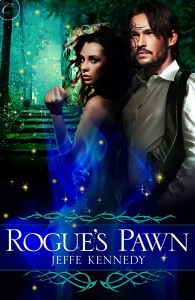 A lot of you have been with me for a long time. In fact, I happen to know that more than a few of you discovered me as an author via my first full-length novel, ROGUE’S PAWN, book one of my COVENANT OF THORNS trilogy. It was also my first fantasy romance, though I didn’t know what genre that was when I wrote it.
A lot of you have been with me for a long time. In fact, I happen to know that more than a few of you discovered me as an author via my first full-length novel, ROGUE’S PAWN, book one of my COVENANT OF THORNS trilogy. It was also my first fantasy romance, though I didn’t know what genre that was when I wrote it.
Well, I just received news that ROGUE’S PAWN will be seeing print! The book will be part of Harlequin’s Direct-to-Consumer shipment in February. For those who don’t know, this is a program where readers subscribe and received a shipment of romances each month. This means a LOT of new people will see this book! I really hope they love it.
This came as a total surprise, seeing as how this book has been out over three years now. But I’m also celebrating the serendipity here – this was a last-minute decision that came right after my move to go to writing full time. I’m calling this a yes vote from the universe.
Feeling pretty good over here!
Support the Ripped Bodice!
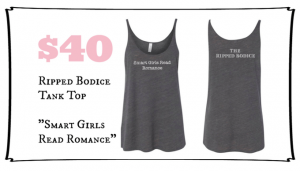 First of all, I’d like to thank everyone for the outpouring of love, cheering, congratulations and general pom-pon waving in response to last Friday’s post on me leaving the day job. You all overwhelmed me, sending me messages of support across all social media – and it’s so very appreciated. If I missed replying to you directly, it’s because I simply couldn’t keep up. Good problem to have! You all are awesome and wonderful and I couldn’t be taking this leap without you.
First of all, I’d like to thank everyone for the outpouring of love, cheering, congratulations and general pom-pon waving in response to last Friday’s post on me leaving the day job. You all overwhelmed me, sending me messages of support across all social media – and it’s so very appreciated. If I missed replying to you directly, it’s because I simply couldn’t keep up. Good problem to have! You all are awesome and wonderful and I couldn’t be taking this leap without you.
Special love to those of you who jumped for joy at the prospect of this meaning more books to read. *MWAH*
I’m settling into a new writing routine and catching up on other things – like cataloguing my teetering TBR pile so I can catch up on my reading! One new feature here, if you look to the right —->>
you’ll note that you can now sign up to follow my blog. No onus. A couple of people requested the ability to do so. There you are.
The other thing I want to mention today is this terrific Kickstarter I’d love to see everyone support. These two gals in Los Angeles are aiming to create a romance-only bookstore called The Ripped Bodice. Their taglines are “Smart Girls Read Romance” and “Purveyors of Fine Smut.” There’s been some debate on Twitter that both “ripped bodice” and “smut” hearken to romance cliches, tropes and stereotypes people aren’t proud of and would like to ditch. I enjoy the wry irony of it myself and backed at the $40 level, just so I can have the tank. 😀 Right now they’re over halfway to their funding goal with 22 days left. But the way Kickstarter works is that they don’t get any funding if they don’t meet their goal.
If you haven’t ever backed a Kickstarter campaign, it’s dead easy, totally secure and super fun. So I’m encouraging everyone to back this puppy! I’d love to sign there someday and I’m hitting up you people to help make that happen.
Cheers!
Report from Mile Hi Con!
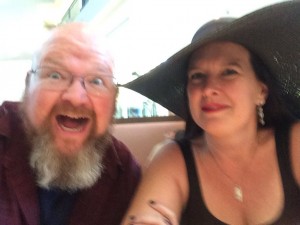 I’m over at Word Whores, giving the report on Mile Hi Con. Warning: includes wild man Kevin Hearne.
I’m over at Word Whores, giving the report on Mile Hi Con. Warning: includes wild man Kevin Hearne.
Leaving the Day Job
 This is a pic of my Cadmus and EPA colleagues in San Juan, Puerto Rico in 2011, the same week my first Carina Press book, SAPPHIRE, released. Environmental consulting for The Cadmus Group has been my day job/primary career for 18 years, as of October 1.
This is a pic of my Cadmus and EPA colleagues in San Juan, Puerto Rico in 2011, the same week my first Carina Press book, SAPPHIRE, released. Environmental consulting for The Cadmus Group has been my day job/primary career for 18 years, as of October 1.
Today was my last day.
Talk about a huge life change for me!
I originally took this job for what I thought would be a year or two until I could support myself as a writer. Guess THAT took a little longer than expected, huh? Eighteen years later, I’m finally taking the leap into writing full time.
However, I want to be honest with you all, because it greatly bothers me when writers represent themselves as “being a full time writer” without disclosing other sources of income. It’s a badge of honor in the writing world, to say one writes full time, as so few writers are able to make a living wage at it. Many “full time writers” are people who’ve retired and are able to live on their pensions, or those who have a salaried and benefitted spouse to take up the income slack. I feel it creates an unfair expectation in aspiring writers when people claim the badge of honor without admitting to those other income streams that allow them to pay the bills.
So, my reality is that I’ve been laid off. I’ve known about the possibility for a long time. The major project I worked on, my niche expertise in drinking water that took me to Puerto Rico, was axed right after that trip. Since then I’ve been scraping for work. Environmental consulting works much like law does – if you don’t have billable hours, you are SOL. I’ve been working on a whole variety of projects over the last few years, but nothing consistent. EPA’s priorities have shifted with money going to different and fewer projects.
Though I was originally hired in an office in Wyoming, I’ve worked from home since 2004, when Cadmus closed that office because the principal there was finally laid off for lack of billable hours. That’s been a great gig for me, as it allowed us to move to Santa Fe so my husband, David, could go back to school after early retirement and have a second career as a doctor of oriental medicine. It also allowed me a flexible schedule to write.
Over a year ago I went to full-time hourly at the company, due to lack of work. As long as I averaged 24 hours per week, I could retain my benefits. If I fell below this for more than two months in a row, then I would lose those benefits. Some months I had more work, some months less. But overall, my day job income has decreased dramatically. This hasn’t been easy as David is still building his practice (he’s about three years in) and his income varies also. Because he took early retirement, his stipend is pretty meager. For the last six years, I’ve been the primary wage earner.
After a very lean August and September at Cadmus, it came as no surprise when I got a call from one of my higher-ups. She said that I could be laid off with a severance package or go to part time hourly, with no benefits.
All these years, with the writing income gradually increasing, I’d always thought there would come a day when the writing money exceeded the day job money and I would give my notice. It never once occurred to me that I could be laid off with severance.
(A big part of me figured I’d be fired for screwing something up, frankly. I managed multi-million dollar contracts and there were so many ways to do something wrong.)
Reader, I jumped at my chance to be free.
It’s been a great experience, in all truth, with people referring to my “sterling record” and the desire to “keep me close as a valued alum.” I may subcontract back in the future if they need my niche expertise again. Because it’s a no-fault layoff, I get the severance money, plus I can cash in my stock options and also file for unemployment. A number of very smart people have advised me not to be too proud to take that last. David has had health insurance via COBRA from his retirement and I can insure both of us through the Affordable Care Act (SO glad we can do this now!) for less than the extortionate sum he’s been paying.
I’m hoping I can pull this off. If it doesn’t work, I can always look for another day job. But I’m tremendously hopeful. I’m going to try to write 5K/day, which will allow me to get some more things in the pipeline. I’m greatly looking forward to having one career and the increased mental energy of focusing on one pursuit. I’m planning to read more books, too. Maybe get some projects finished around the house.
Mostly, I feel joyfully free!
The Most Ancient of Shapeshifters
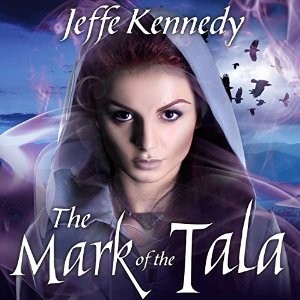 I’m over at Here Be Magic, talking about what makes shapeshifters different from were-creatures.
I’m over at Here Be Magic, talking about what makes shapeshifters different from were-creatures.